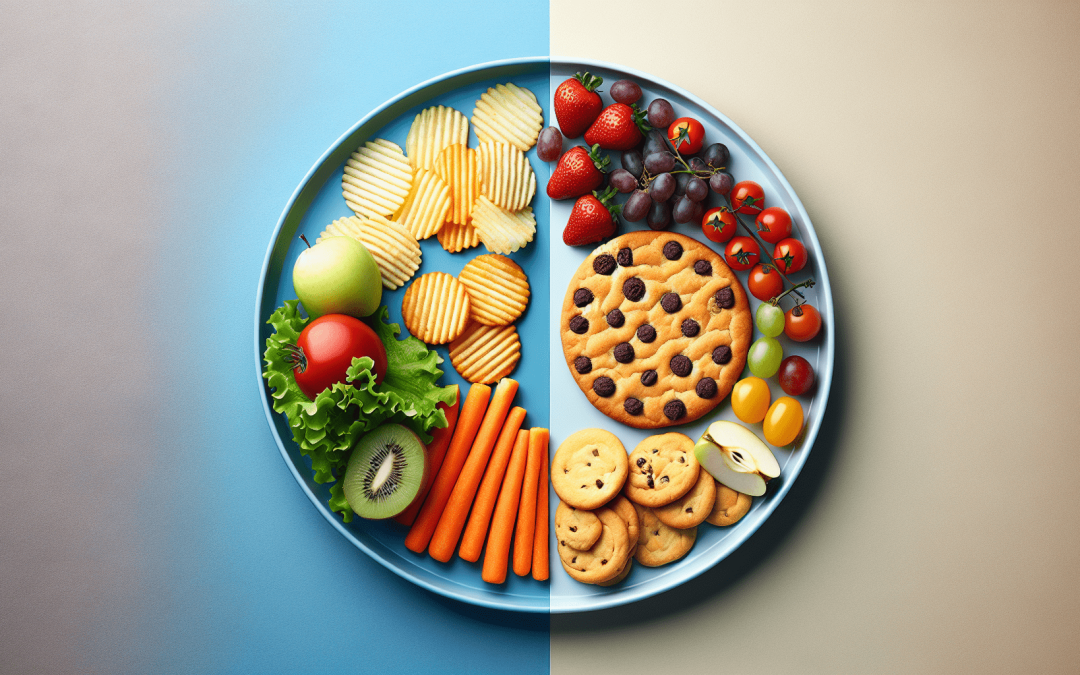Are you looking to boost the nutritional value of your meals?
Making simple swaps in your diet can help increase the nutrient density of your meals, providing your body with essential vitamins and minerals. By making conscious choices in your food selection, you can improve your overall health and well-being. Let’s explore some easy swaps you can make to enhance the nutrient content of your meals.

Whole Grains vs. Refined Grains
Choosing whole grains over refined grains is a simple way to boost the nutrient density of your meals. Whole grains are packed with fiber, vitamins, and minerals that are stripped during the refining process. Switching from white bread, pasta, and rice to their whole grain counterparts can increase the nutritional value of your meals.
Try this simple swap:
| Refined Grain | Whole Grain |
|---|---|
| White bread | Whole wheat bread |
| White rice | Brown rice |
| Regular pasta | Whole wheat pasta |
Making these substitutions can add fiber, B vitamins, and antioxidants to your diet, providing long-lasting energy and improving gut health.
Lean Proteins vs. Fatty Proteins
Opting for lean proteins over fatty proteins can reduce saturated fat intake and increase the nutrient density of your meals. Lean proteins such as chicken, turkey, fish, and legumes are lower in calories and saturated fat compared to fatty cuts of meat. By making this swap, you can improve heart health and support weight management.
Swap out these fatty proteins for lean options:
| Fatty Proteins | Lean Proteins |
|---|---|
| Bacon | Turkey bacon |
| Ribeye steak | Chicken breast |
| Ground beef | Ground turkey |
By choosing lean proteins, you’ll lower your cholesterol levels, reduce inflammation, and support muscle growth.
Colorful Fruits and Vegetables vs. Processed Snacks
Incorporating colorful fruits and vegetables into your meals can significantly increase their nutrient density. Fruits and vegetables are packed with vitamins, minerals, fiber, and antioxidants that are essential for good health. By replacing processed snacks with whole fruits and veggies, you can improve your immune function, digestion, and overall well-being.
Make this swap for a healthier snack option:
| Processed Snacks | Colorful Fruits and Vegetables |
|---|---|
| Potato chips | Carrot sticks with hummus |
| Candy bars | Sliced apples with almond butter |
| Cookies | Mixed berry smoothie |
Choosing colorful fruits and vegetables as snacks will provide your body with essential nutrients and help curb cravings for unhealthy foods.

Healthy Fats vs. Trans Fats
Switching from trans fats to healthy fats can dramatically improve the nutrient density of your meals. Trans fats, commonly found in processed and fried foods, can increase bad cholesterol levels and raise the risk of heart disease. Healthy fats, such as avocados, nuts, seeds, and olive oil, provide essential fatty acids that support brain health, reduce inflammation, and promote satiety.
Swap out these trans fats for healthy fat options:
| Trans Fats | Healthy Fats |
|---|---|
| Margarine | Avocado |
| French fries | Mixed nuts |
| Doughnuts | Chia seeds |
Incorporating healthy fats into your meals can enhance the absorption of fat-soluble vitamins and decrease the risk of chronic diseases.
Hydrating Beverages vs. Sugary Drinks
Replacing sugary drinks with hydrating beverages can improve the nutrient density of your meals and support overall health. Sugary drinks like soda, fruit juice cocktails, and sweetened teas can lead to weight gain, tooth decay, and increased risk of chronic diseases. Opting for hydrating beverages such as water, herbal tea, and infused water can keep you hydrated and promote optimal bodily functions.
Make this switch for a refreshing and hydrating beverage:
| Sugary Drinks | Hydrating Beverages |
|---|---|
| Soda | Sparkling water with lime |
| Fruit punch | Herbal iced tea |
| Sweetened iced coffee | Cucumber mint infused water |
Choosing hydrating beverages over sugary drinks can prevent dehydration, improve skin health, and support digestion.
Home-cooked Meals vs. Restaurant Meals
Preparing home-cooked meals instead of dining out frequently can significantly boost the nutrient density of your food. Restaurant meals often contain excessive amounts of salt, sugar, unhealthy fats, and additives that can negatively impact your health. Cooking at home allows you to control the ingredients and cooking methods, enabling you to create nutritious and balanced meals.
Try these simple tips to make home-cooked meals more nutrient-dense:
- Incorporate lean proteins, whole grains, colorful fruits, and vegetables into your recipes.
- Use herbs, spices, and citrus juices as healthy flavor enhancers instead of excess salt and sugar.
- Experiment with different cooking techniques like grilling, roasting, and steaming to retain nutrients and reduce added fats.
By preparing meals at home, you’ll have better control over portion sizes, ingredients, and cooking methods, ensuring that your meals are both delicious and nutritious.
Final Thoughts
Making simple swaps in your diet can have a significant impact on the nutrient density of your meals. By choosing whole grains, lean proteins, colorful fruits and vegetables, healthy fats, hydrating beverages, and home-cooked meals, you can enhance your overall health and well-being. Incorporate these easy swaps into your daily routine to boost the nutritional value of your meals and feel your best inside and out. Remember, small changes can lead to big results when it comes to improving your diet and overall health.








